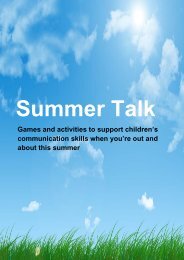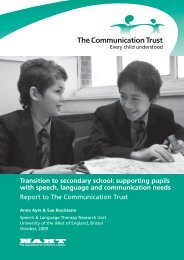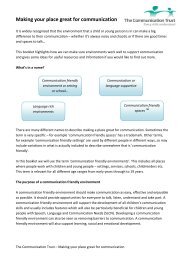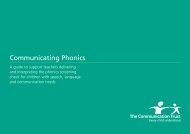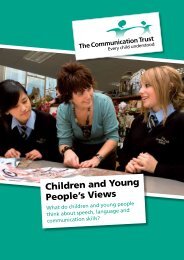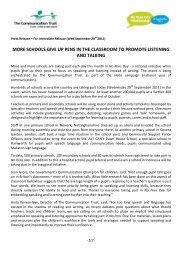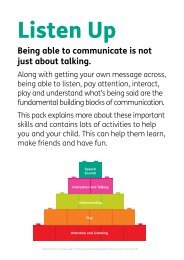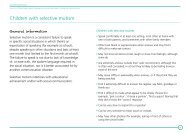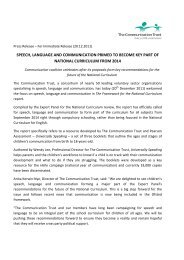A Generation Adrift - The Communication Trust
A Generation Adrift - The Communication Trust
A Generation Adrift - The Communication Trust
You also want an ePaper? Increase the reach of your titles
YUMPU automatically turns print PDFs into web optimized ePapers that Google loves.
<strong>The</strong> context<br />
‘It is a skill which has to be taught, honed and nurtured. Yet… children’s ability to<br />
communicate, to speak and understand [is] taken for granted’<br />
Bercow Report, 2008 7<br />
<strong>The</strong>re have been some positive<br />
changes since John Bercow MP carried<br />
out his review in 2008 which found a<br />
fundamental lack of understanding of<br />
communication, alongside a national<br />
inequity of provision and support for<br />
children with speech, language and<br />
communication needs (SLCN).<br />
<strong>Communication</strong> has a growing<br />
presence in national policy,<br />
particularly in education policy:<br />
D Language and communication is<br />
now one of the three core strands<br />
of the early years foundation<br />
stage 8<br />
D Recommendations made by<br />
the Nutbrown Review of early<br />
years education, highlighted<br />
the importance of a qualified<br />
workforce in the early years who<br />
understand how to develop<br />
young children’s language skills 9<br />
D Both the Allen Review of Early<br />
Intervention 10 and the Field’s<br />
Review of the Foundation Years 11<br />
made made clear that language<br />
and communication development<br />
at age 3 was one of the major<br />
National Life Chances Indicators<br />
for children<br />
D <strong>Communication</strong> has a strong<br />
position in the new Ofsted<br />
inspection framework, both in<br />
relation to teaching and learning<br />
and with a focus on those children<br />
who don’t attain well<br />
D <strong>The</strong> Education Select Committee<br />
on Behaviour and Discipline in<br />
Schools made very powerful<br />
recommendations around the link<br />
between SLCN and behaviour<br />
D <strong>The</strong> Primary National Curriculum<br />
Expert Panel concluded that<br />
spoken language should be<br />
a strong feature of any new<br />
National Curriculum and<br />
dedicated a chapter of their report<br />
to it<br />
D <strong>The</strong> secondary curriculum<br />
now includes elements of<br />
communication within specific<br />
subject areas, as well as English<br />
D <strong>The</strong>re is a focus on language in<br />
the Department of Health Healthy<br />
Child Programme and 2 year<br />
check<br />
However, there continues to be a way<br />
to go to ensure policy reflects other<br />
necessary changes:<br />
D Systematic initial and continued<br />
professional development for<br />
teachers to support knowledge<br />
and skills of speech, language and<br />
communication and SLCN<br />
D Continued need for a graduated<br />
response to support all<br />
children’s speech, language and<br />
communication<br />
D Accurate profiling and careful<br />
monitoring of progression for<br />
children with SLCN in schools<br />
D Integrated service provision of<br />
speech and language therapy<br />
services<br />
D Real joined up policy for children<br />
with SLCN / Special Educational<br />
Needs as outlined in the<br />
forthcoming Children and Families<br />
Bill<br />
Through Hello, the national year<br />
of communication (2011), 12 there<br />
has been a shift in awareness<br />
of communication. <strong>The</strong> national<br />
campaign, with support from<br />
more than 200 local co-ordinators,<br />
supported parents, teachers and<br />
other professionals to gain a greater<br />
understanding of the issue. <strong>The</strong> Hello<br />
evaluation demonstrated positive<br />
changes in the understanding of the<br />
issue, though there remains a long<br />
way to go. 13<br />
<strong>The</strong>re remains a need to translate<br />
the positive changes seen in national<br />
policy to equal shifts in local practice<br />
as currently there is a very large gap<br />
between the two. Both research<br />
and anecdotal feedback from grass<br />
roots professionals stress the huge<br />
challenges that remain in ensuring<br />
children with SLCN are identified<br />
and supported through local service<br />
provision.<br />
<strong>Communication</strong><br />
has a strong<br />
position in the<br />
new Ofsted<br />
inspection<br />
framework.<br />
A <strong>Generation</strong> <strong>Adrift</strong> 9




